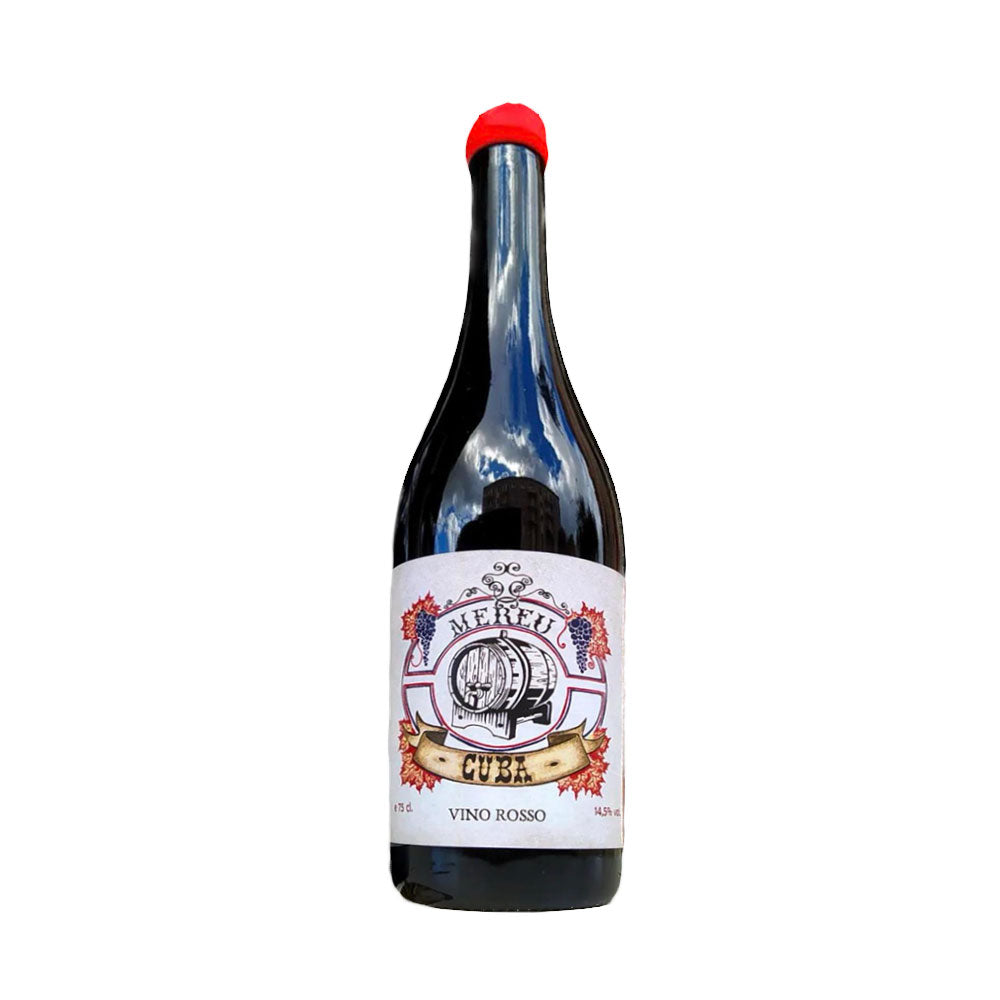
Cuba | Mereu
TYPE: red
GRAPES: monica, muristeddu, cannonau
ORIGIN: Italy, Sardinia
DEVELOPMENT: 5-7 years
SERVING TEMPERATURE: 18° C
RECOMMENDED GLASS: large glass
ALCOHOLIC CONTENT: 14.5% vol.
FORMAT: 75 cl
THE WINE:
TECHNICAL SPECIFICATIONS
FRESHNESS: ◼︎◼︎◼︎◻︎◻︎
BODY: ◼︎◼︎◼︎◼︎◼︎
FLAVOUR: ◼︎◼︎◼︎◻︎◻︎
SOFTNESS: ◼︎◼︎◼︎◻︎◻︎
TANNICITY: ◼︎◼︎◼︎◼︎◼︎
NOTES FROM OUR SOMMELIERS
👁 intense ruby red;
👃🏻 the nose expresses mature and complex aromas: red fruit jams, fruit in alcohol, dehydrated plums, and intriguing notes of spices;
👄 on the palate it is a structured red, with a powerful attack made more vigorous by freshness and flavor, and perfectly balanced by softness. Intense and persistent, with great character.
RECOMMENDED COMBINATION
A full-bodied red, to be paired with equally structured and characterful dishes: meat-based first courses, tasty and mature cheeses such as Fiore Sardo, but also grilled red meats and all game dishes.
REFINEMENT
From a vineyard of just over one hectare located 650 meters above sea level, trained as a low tree and exposed to the south-east. The soil is sandy and granitic, the processes are entirely traditional. Treatments only with copper and sulphur. The grapes are harvested by hand from mid-September. Spontaneous fermentation on indigenous yeasts, sulphurous reduced to a minimum. Ten months in wooden barrels.
YOU WILL LOVE IT FOR...
The typicality.
TERRITORY OF ORIGIN:
TERROR
The cultivation of vines was introduced in Sardinia when the Phoenicians settled on the island and founded their colonies in the fertile southern areas, between the 8th and 7th centuries BC. Even today, in the Sulcis area, in Campidano and in Gallura, the The names of some Sardinian villages, of Phoenician origin, recall the vine and its fruit.
The Romans found modern viticulture on the island, which was developed, but the trade stimulated by agriculture and viticulture slowed down significantly with the collapse of the Roman Empire. The wine sector remained anonymous for centuries, until the subsequent dominations of the Byzantines and the Arabs. From the end of the fifteenth century Sardinia became a Spanish province, which had negative consequences for agriculture. The only positive data is the introduction of Iberian vines (including Cannonau).
With the Savoy domination the fortunes of viticulture improved. Since 1949, having obtained administrative independence, many social wineries have arisen, starting the path of quality for Sardinian wine.
By extension, Sardinia is the second largest island in the Mediterranean; its territory is 80% mountainous and hilly (of which 68% is made up of hills and rocky plateaus). Some characteristic soils are called giare or gollei, if granitic or basaltic, others, instead, heels or tonneri, if sandstone or limestone.
The climate is Mediterranean. The average altitude is 334 meters above sea level, although the highest massif on the island, the Gennargentu, reaches 1834 metres, while other lower massifs are found in Gallura, Sarrabus and Iglesiente-Arburese.
The region has 1 DOCG (Vermentino di Gallura) and 17 DOC.
The main native white grape varieties: Malvasia Bianca, Malvasia di Sardegna, Nasco, Nuragus, Semidano, Torbato, Vermentino, Vernaccia di Oristano, Semidano, Arvisionadu; red grapes: Bovale, Caddiu, Cagnulari, Cannonau, Carignano, Girò, Monica, Nieddera, Pascale, Barbera sarda, Nieddera, Girò.
CELLAR
We are in Sorgono, in the center of Sardinia, among the high hills of Mandrolisai. The winery is run by Enrico and his uncle, who cultivate the vineyards and have repurposed the family mill.
Mereu grows the typical grapes of the area (Cannonau, Monica and Muristellu), from old vines grown as saplings for wines full of taste and character. Never banal and capable of transporting you into the true winemaking tradition of central Sardinia.
The almost centenary vineyards of the Mereu winery are located along the road from Sorgono to Ortueri: kissed by the sun and caressed by the wind.
The management of the cellar is accurate, with maximum respect for the grapes and the essence of the local wines, with the valorisation of the native grapes and an approach that is most natural possible. Manual work in the vineyard and respectful approach in the cellar for direct, typical and original wines.

When will I receive my order?
If the bottle is in stock it will be sent immediately and you will receive it in a couple of working days.
Is the order renewed?
No, this product is not bound by any type of subscription and cannot be renewed.
Is there a minimum number of bottles?
No, you do not have to order a minimum quantity of bottles: you can choose to receive just one bottle of each type.

This product has no reviews yet.

